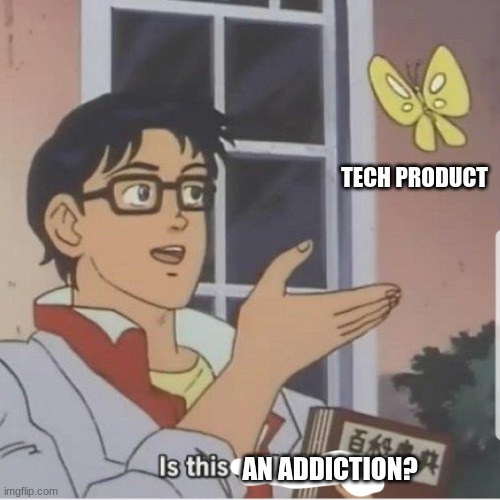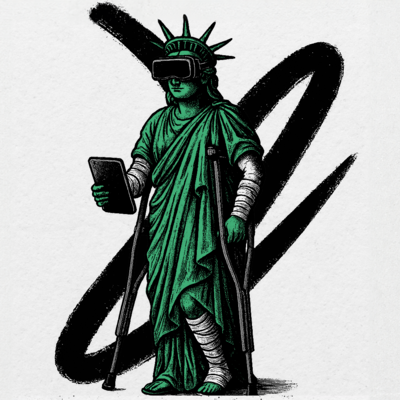
This essay is brought to you by On Deck Sales
On Deck Sales (ODSales) is a curated community for sales leaders and senior professionals who want to accelerate their careers and level up alongside trusted peers.
Long-time readers are probably picking up that I’m feeling down about the potential collapse of civilization thing. It is still to be determined whether this is a temporary intellectual blip or a firm thesis, but regardless, I’m on the hunt for technological hope. Today’s interview is my attempt to find it.
One of the topics that I’ve been most interested in lately is addiction. Last month I summarized my thoughts on addiction and technology as follows:
“As the world shifts to more digital competition, one of the most powerful long-term advantages is addiction. For businesses, this means that services that can grab and hold consumers’ attention for longer will be rewarded. For consumers, it means that we will have to be ruthless in our relationship with technology. Business best practices are not equivalent to consumer best interests. Whether professionally or personally, all of us will need to understand and reconcile ourselves to this phenomenon. In the years to come, whoever responds best will be rewarded.”
There are few people on the planet better to talk to about this as Nir Eyal. Nir is a behavioral designer, investor, author, and consultant that helps companies build the products and services that build healthy habits in users' lives. He has written two bestsellers. The first book, Hooked, was about how to build habit-forming products. The second book, Indistractable, was about how we break bad habits.
The conversation we had was fascinating with two primary takeaways:
- The market will reward all companies, regardless if they are in the technology sector or not, if they are able to create the most engaging product.
- We have the power to fight back in our individual lives.
Note: This interview has been edited for length and clarity.
Startups are either building or selling. For sales leaders, scaling a company while growing professionally is hard. On Deck Sales (ODSales) is a curated community for sales leaders and senior professionals who want to accelerate their careers and level up alongside trusted peers.
Discuss challenges, learn leading-edge best practices and frameworks, and level up alongside a community of world-class peers.
Two specialized programming paths:
- The Modern Sales Leader: For high-performing Sales Leaders with aspirations to rise to executive leadership.
- Senior IC: For experienced Individual Contributors looking to hone and improve their arsenal of tools.
The importance of being precise with language when talking about addiction
I think words really matter, especially when we're talking about pathologies. An addiction is defined as a persistent compulsory dependency on a behavior or substance that harms the user—it is a pathology. In our society it's become a word that we toss around whenever we mean we like something a lot. That's a big mistake and I think it's a big mistake. It really doesn't do any service to people who suffer from this terrible disease of addiction, which afflicts about 3 to 5% of the population. It is a disease. It is not, ”I like Candy Crush, I like Nestle.” That is a different category altogether. It's people who, despite the harm it's doing them, cannot stop or have severe difficulty stopping without some professional therapy. So it really doesn't do a service to people who suffer from this terrible disease. Just like we shouldn't say, "I'm so ADHD." when you've never had a diagnosis.
Why we don’t want technology to be less engaging, actually
When it comes to the specific question around products built to be engaging, that is what they should do. “Hey, Netflix, can you please make shitty shows? Because I like to watch your shows a lot. Hey, Apple, your devices are really user-friendly. Can you please stop making them so user-friendly?” No. We want these products to be engaging. This isn't a problem, this is progress. Products made to be engaging—not addictive, engaging—are great. We finally live in an age where you can relax after work, and instead of taking a drink or a hit or something, you can watch some TV to escape reality for a little bit, and it's pumped into your house for free or next to free.
Why tech companies don’t want to addict their customers
The goal of these tech companies is not to addict you, because people who get addicted tend to burn out. If you play a video game to the point where your social life suffers, where your spouse is angry at you, where your dog is crapping all over the floor, because you're not taking them on a walk, your life suffers. Eventually, unless you have a pathology of addiction, the vast majority of people have this circuit breaker in their brain that goes off. They say, "What am I doing? I need a life. I don't want to be a loser who just sits indoors and plays video games all the time. I want to play video games a little bit." That is directly aligned with the incentives of the media industry. They don't want to burn out their customers., They want their customers to use their products for the rest of their lives.
What happens to companies that don’t create engaging experiences for their customers
Look at Facebook, for example. I don't know anybody under 35 who uses Facebook. I know Facebook owns WhatsApp and Instagram, but they're bleeding users under 35, because that product doesn't work for them anymore. It sucks too much of their time and attention, it's full of political garbage, it doesn't give them what they want. So people are going over to Snapchat, they're going over to TikTok, where I would argue it's a much healthier environment,
The beauty of our capitalist system is that the market has an incentive to create a better product. Because if Facebook doesn't make sure that users want to continue to use their product and make sure they don't burn people out, users go elsewhere. I think it's a beautiful demonstration of how, if you don't take care of your customers—if you risk them regretting using your product—they're going to go somewhere else.
The battle for user attention is not a new phenomenon
Let's say that there is this crazy new product that's invented tomorrow that you sit in front of. When you're not at work and when you're not doing things that you have to do to survive, you love spending time with this thing. You're spending so much time with it, in fact, people are spending five hours a day with it. You know what I'm describing, don't you? It's called the television.
The average American, according to Nielsen, spends five hours a day watching television. How many articles have you read recently about how technology is so bad, and the apps are this and the video games are that, that's the cause of all our problems. Why are we not pointing a finger at traditional media? Which is where people are spending way more time. I would much rather have someone engaging on a social network with a fellow human being or playing a video game with a friend across the country, live interacting with each other, then watching the stupidity that cable news is putting into people's brains.
Do you see what I'm saying?There's hypocrisy here. We only talk about the bad stuff that the new technology does. “Oh my God, the video games, the children.” Meanwhile, the New York Times, who holds them accountable? Fox News, who holds them to account? Who's watching, who cares about the fact that these companies have the same exact incentive of getting people to spend as much time as possible with their TVs, with their online portals? The New York Times and Fox News will never tell you, "Hey, guess what, buddy? You've had enough information, go have a life." They're never going to tell you that and they never will.
Why worrying about addictive technology is a luxury
I think we need to stop moralizing and medicalizing and saying, "Well, you playing video games, that's bad, but me watching football, that's okay." It's a pastime and it's a luxury, again, putting it into historical context. It's a luxury that people have this much time on their hands to puss around with video games and Netflix, because that means that they don't have to work to put food in their mouth per se, hard work. This is very much a yuppie problem., pPeople like you and I, we're talking about this. We're not the people who are living hand to mouth, who have no free time, because they're working two jobs. So we have to put it in perspective that, what does this all mean? It doesn't mean that society is getting worse, in fact, I think it means society is getting better.
Is there a role for regulation in managing addictive tech?
Is the answer that the government steps in and puts in a stopping queue, that after 30 minutes of watching, the government says, "Please go away"? That's never going to happen.
There's lots of room for regulation in terms of misinformation and monopolies. And there's a special responsibility that companies have for addicts—I do agree with legislation to help the 3 to 5% of the population that is addicted. I'm not saying that media shouldn't be regulated. It should be regulated. But it shouldn't be regulated to make the product less engaging. That's the point—these product are designed to be engaging, because that's what we as the consumers want.
What I take issue with is that people think that asking these companies to change, or asking the government to force these companies to change, is the first step. That's the last step. We need to do that. But first, what can you do for yourself? First, let's think about personal responsibility. First, think about the few things that everyone can do to become indistractable right now. Because if you hold your breath, waiting for these companies to change, you're going to suffocate. So why would we wait?
The role of willpower in resisting addictive technology
A lot of people think that willpower is a depletable resource, that you “run out of willpower”, you feel spent. I used to do this, I would come home from work and it's, "Oh, I had such a tough day. I deserve a pint of Ben and Jerry's and I'm going to sit on the couch and watch Netflix, because I have no more willpower left."
A researcher at Florida State that did several studies around this concept called “ego depletion.” It’s the idea that we run out of willpower like gas in a gas tank or battery on your phone. This is what we do in the social sciences:, when a study sounds too good to be true, we replicate the study. And what we found from meta studies is that ego depletion doesn't actually exist. Science is never done, but from the evidence we currently have, it appears that ego depletion is not real. You do not run out of willpower.
It is the nocebo effect, the opposite of the placebo effect. The more we talk about this, excuse me, bullshit that screen time is melting your brain, that it's bad for you, the worse it is for people.
The real reason people become distracted is not what we think
The number one revelation that I learned— and there's studies that show this— is, that only 10% of the time that we get distracted, do we get distracted because of what's called an external trigger. An external trigger is something in our outside environment, the ping, ding or ring that leads us off track
The other 90% of the time we get distracted, we get distracted because of what's called an internal trigger. An internal trigger is an uncomfortable emotional state that we seek to escape: loneliness, boredom, fatigue, uncertainty, stress, anxiety.
We need to realize that distraction is not a moral failing, it's not that something's wrong with you. For the vast majority of people it's simply that we haven't learned how to deal with emotional discomfort in a healthy manner. In an age of abundance, where we have more calories than we could ever eat, more information than we could ever consume, many of us, including myself, turn to these things to take our mind off of what we're feeling.
So step number one is mastering those internal triggers. Then you can hack back the external trigger. This is some of the simple stuff we talked about earlier, removing notifications, things like that. Anybody can do it. Then the fourth step is preventing distraction with pacts.
On making time for technology on your terms
There's nothing wrong with going on Facebook or watching Netflix or playing video games. But don't do it on their schedule. Do it on your schedule. Put in the amount of time that you want to spend doing these things, that it helps you live according to your values. Turn your values into time and say, "Yeah, I'm going to play video games. I'm going to go on social media. I'm going to do that from 7:00 PM to 9:00 PM. That's my social media and video game time." Do it, enjoy it, but don't do it to escape reality, do it because it's on your schedule.
How to become indistractable
I think that the world is really bifurcating into two kinds of people. The people who let their time and attention get controlled and manipulated by others and people who say, “Enough, I will decide for myself.” Those are people who are going to call themselves indistractable.
What I would recommend is, can you take a small step and say, “Hey, when I feel this discomfort, that leads me to distraction. What am I going to do instead?” That would be a good first step. Can I put some of the distractions on my schedule to turn them from distractions into traction, by making time for them? Can I make a couple of adjustments in my environment, so that I'm not constantly pinged and dinged. Then where I really need to, can I use pacts to make sure I stay focused?
Where to find Nir if you’re interested in learning more
My website is www.nirandfar.com. The book is called Indistractable: How to Control Your Attention and Choose Your Life.
The Only Subscription
You Need to
Stay at the
Edge of AI
The essential toolkit for those shaping the future
"This might be the best value you
can get from an AI subscription."
- Jay S.
Join 100,000+ leaders, builders, and innovators

Email address
Already have an account? Sign in
What is included in a subscription?
Daily insights from AI pioneers + early access to powerful AI tools








.08.31_AM.png)

Comments
Don't have an account? Sign up!
Oh great! Another article by non-addicts telling addicts to just use more willpower and it’s their fault they’re weak willed.
Come on, get some new material. We’ve seen this for ages.
P.S. This does not work for addicts. That’s why it’s an addiction and we need community support.
@me_2215 Hey—I think Nir was pretty fair in calling out the difference between those diagnosed with addiction and the rest of us. He specifically made sure to call out the difference between the two groups.
@ItsUrBoyEvan yes, I read his nice section at the top about the difference. Sadly, he did not take his own words to heart and continued using addiction and addicting throughout the rest of the piece I’m exactly the way he mentioned was inaccurate and harmful.
It doesn’t count if you call out the harm you are doing and then immediately engage in that behavior.
This is a lazy piece.
@ItsUrBoyEvan
This near the end: “I think that the world is really bifurcating into two kinds of people. The people who let their time and attention get controlled and manipulated by others and people who say, ‘Enough, I will decide for myself.’”
Even when not speaking about an actual addiction using the very language he states at the top he shouldn’t use, he then uses harmful tropes about people who apparently have willpower and then the sorry rest.